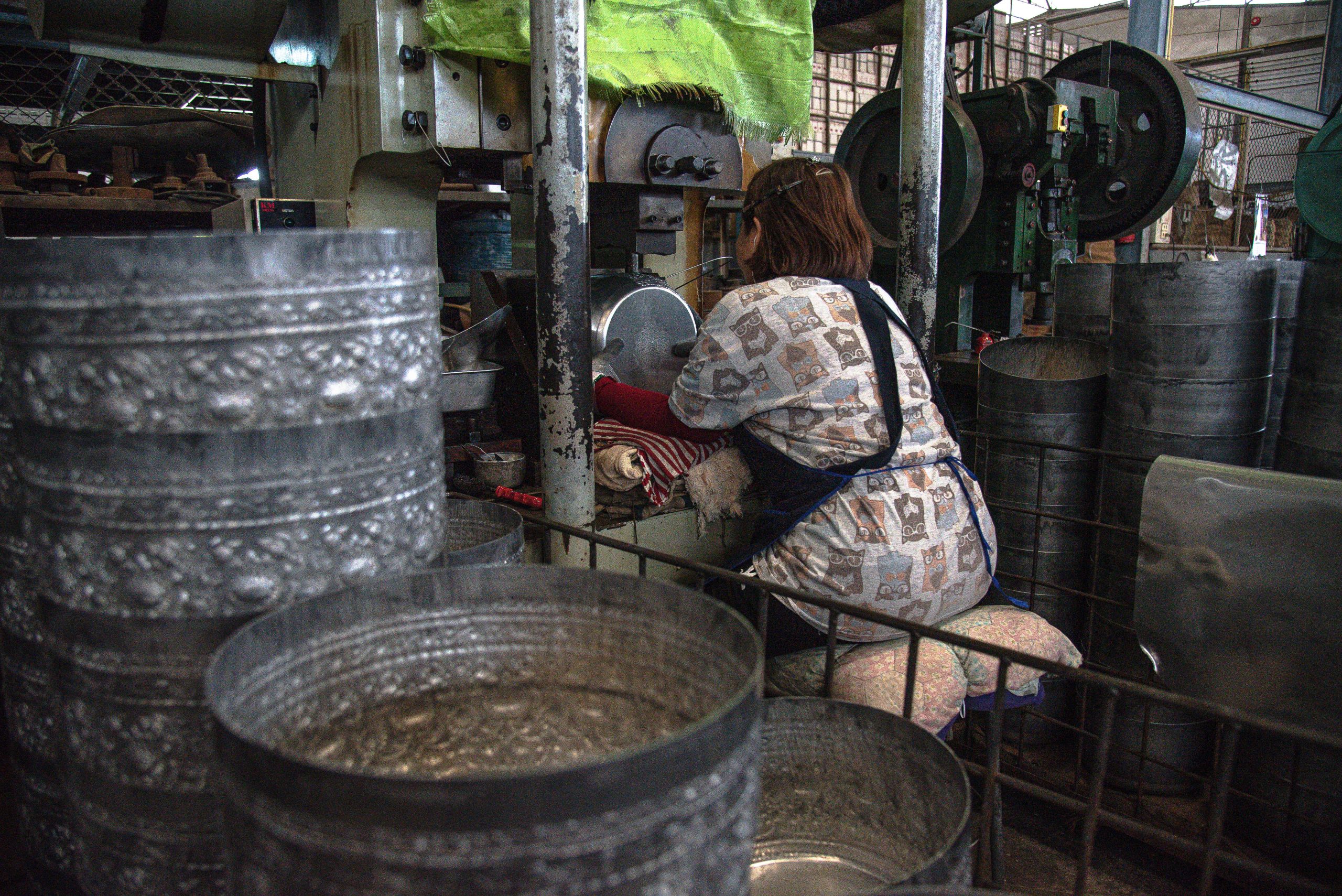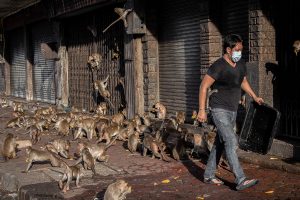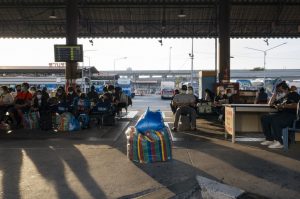All images: Laila Tahe/Rice Media Thailand
In a blink of an eye, it’s already April. In the hottest month in Thailand, the sun will transit from Pisces into Aries, marking a new beginning in the Thai solar calendar.
Well, at least that’s how it used to be. Monitoring the stars and their movements in the skies isn’t conducive to modern affairs governed by the Gregorian calendar. Having the Thai New Year’s Day fall on a different date every year would, understandably, be an administrative nightmare. The solution has been to proclaim fixed national holidays based on the Gregorian calendar that Thailand shares with the rest of the world.
This is how April 13 has come to mark the last day of the old year; April 14, the transition into the new year; and April 15, the first day of the new year itself.
During this hottest time of year, the people of Thailand erupt into an aquatic frenzy, celebrating the occasion with a nationwide water fight lasting at least three days. If you have been to Bangkok, Chiang Mai or any city during this time of year, you know not to venture out of your air-conditioned abodes unless you are prepared to be drenched from head to toe.
Still, the raging pandemic means that celebratory events have been cancelled or downsized for the past two years. Now that the kingdom is reopening its borders to international travellers, some of us are hopeful that the festivities may resume, although we are unsure what the “new normal” may entail.
The nationwide hydro-battle that Songkran is famous for is relatively new. When I was younger, Songkran was much tamer—we didn’t close down roads and boulevards for water play. I certainly didn’t have a powerful water cannon to fend off an army of neighbourhood kids.
Thinking back about my childhood years reminded me of khan—a traditional container that is a cross between a bowl and a bucket and was once ubiquitous in every Thai household. Thais often use it to wash their face, shower, do laundry, and do many other water-related activities. During the Songkran holidays, they also played a central role, wielding as an aquatic weapon for a proper water fight.
Today, most khan are made of plastic, although they are traditionally metallic and can either be plain or embossed with intricate details. The latter made headlines last year when Deputy Prime Minister Prawit Wongsuwan had a number of them stamped with “Happy Songkran” and given out as gifts. These days, however, khan are seldom used in homes nor at Songkran, relegated to nothing more than mere tokens of novelty.
Still, the heritage and history of the khan aren’t forever lost, engulfed by the ravages of time and modernity. In my quest to discover khan’s role in today’s modern world, I found a reputable metalworking factory specialising in Thai-style embossed traditional containers.
Through my conversation with the owner over the phone, I expected someone in his late forties. Imagine my surprise when 31-year-old Earth greeted me at my car, sporting a simple white polo, looking no older than a fresh graduate. Earth is the second-generation owner and operator of Suchai Metalwork, taking over the reins from his father, Tuk.
Suchai Metalwork was founded a little over 60 years ago when Earth’s grandfather, after seeing a hairdresser use heated aluminium rolls to perm a customer’s hair, thought he could make and sell them to other hair salons. His business idea was a hit, and his workshop had since branched out to many other aluminium products, including khan. The family also began embossing their aluminium kitchenware products to set its business apart from competitors and create a certain value-add at the same time.
According to Tuk, Thai pots, pans and sundry other containers were once primarily made of plated cast iron. Aluminium products were for show and less heavy-duty usage since they would tarnish easily when they came into contact with the acidity of many ingredients in Thai cuisine. It is only in recent years that cheap stainless-steel products from China have outcompeted cast-iron products.
“Plastic wasn’t much of a competitor in the beginning either, but now manufacturers can produce a wide variety of plastic products that compete directly with what we made,” he said.
“Between our embossed and plain kitchen utensils, which one do you think sells better?” Earth asked.
“The plain ones? They go with everything,” I offered.
“Wrong! The embossed ones always sell better,” Earth grinned, holding up one of his family’s intricate aluminium products. “The Thai-style kitchenware always sells better because plastic containers usually outcompete our plain products. Embossed stainless-steel kitchenware requires the practised hands of a seasoned craftsman. They are more difficult to make, and there are fewer competitors.”
“Craftsmanship and culture are part of our competitive edge,” Earth elaborated, pride brimming in his voice. “I was at a Thai restaurant the other day, and they used our products.”
Thai consumers used to buy these elaborate containers regularly—they didn’t need a special occasion or an excuse. They were once considered everyday items.
Still, consumers would buy them up whenever a new material was introduced. Some people even put them in display cases. That, sadly, is not how it is today. Anyone using these embossed containers is regarded as old-fashioned. The products themselves have been delegated to traditional events, themed restaurants and the tourism industry.
It is clear that the paradigm has shifted. Even people from the older generations see the embossed kitchenware as outdated. They don’t use them in their daily lives. They have become craft items to be sold to foreign visitors.
“Did your Songkran sales drop?” I asked.
“Yes and no. Typically speaking, our clients buy them within the first quarter of the year, January to March, in anticipation of Songkran. We don’t usually get new orders until a week before Songkran itself. So, unfortunately, the burden fell on our buyers, who thought they would be able to sell these products,” Earth responded.
“We were also pretty lucky. We received a sizeable order this past year, allowing us to get rid of our stock.
“Before COVID, we used to work from 7 a.m. to 4 p.m. and then there was even overtime work. But we’ve since had to stop that. Our employees understand where we’re coming from, though. Many of them have worked with us for 20–30 years. We need to play as a team to ensure that we will get through this together,” he continued.
“For the past decade, sales would spike at certain times of the year. It’s a far cry from before, where we enjoyed steady and consistent business to the point where we could barely cope with the demand.”
Regrettably, I think the golden days of khan in Thailand are over, but Earth and his father are determined to keep the tradition going. On top of closely monitoring market trends and demand, Suchai Metalwork has branched out to new product lines and markets. Earth himself is getting more involved, learning the ropes from his father and making his contributions.
“Every time I secure a new deal, I prove to my parents that I can do this. After all, that’s why I’m here: to continue the family business and make it better with what I can bring to the table.
“I want to take this business West, starting with Etsy. We have been on the platform for a while and received a few orders. It’s slow for now in terms of marketing and sales, but it requires very little investment,” Earth explained.
He acknowledged that Etsy was nothing compared to the many international trade fairs his father and grandfather had attended. Although the cost of participation was astronomical, the results were worth it. He noted that the Middle East was a particularly good market, thanks to their excellent purchasing power and appreciation of artistry.
Unfortunately, his family had to stop marketing their products there due to the war. Earth has heard that there is still demand, though. This 3-generation family business relies on neighbouring countries in Southeast Asia, especially Laos, Cambodia, and Myanmar, who share similar beliefs and traditions to Thailand.
“They need our products for their religious ceremonies,” Earth told me.
For the time being, khan still bears a cultural significance in Thailand, although their seasonal sales have suffered due to the pandemic. Companies like Earth’s are now largely dependent on orders from neighbouring countries, where similar local traditions remain deep-rooted and strong. Now that most of the world is opening back up, maybe khan’s lease on life will be extended. Only time will tell.






